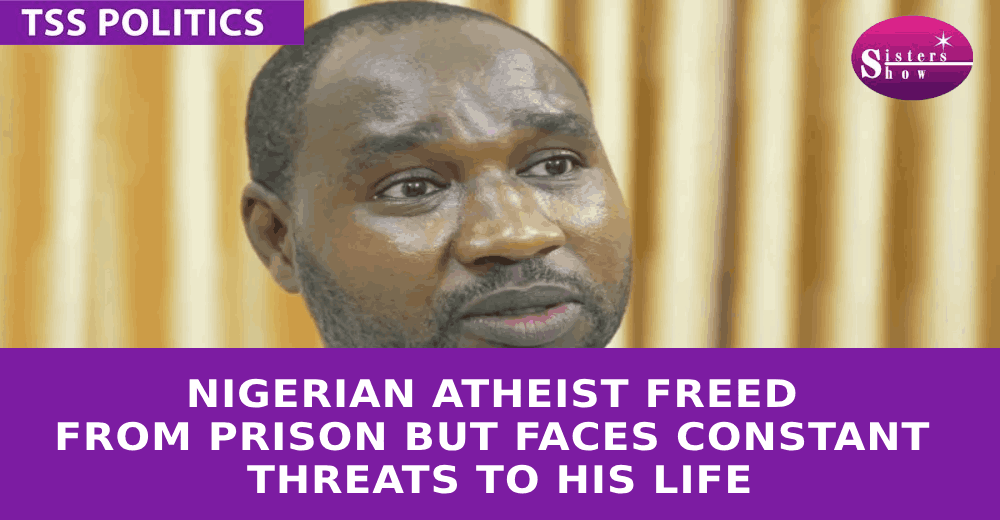
NIGERIAN ATHEIST FREED FROM PRISON BUT FACES CONSTANT THREATS TO HIS LIFE
Mubarak Bala, a prominent Nigerian atheist, has been freed from prison after serving over four years for blasphemy. However, despite his release, he now faces an uncertain future, living in a safe house as his legal team and supporters fear for his life.
The Case of Mubarak Bala
Bala, 40, was convicted for blasphemy following a Facebook post he shared in 2020 that caused widespread controversy. The post, which was deemed to have insulted religion, led to his arrest and conviction on 18 charges in Kano, a predominantly Muslim state in Nigeria.
The conviction, which initially saw him sentenced to 24 years in prison, was reduced by an appeals court last year after being deemed excessive. However, Bala’s decision to plead guilty, although it raised questions among many—including his legal team—was made with the belief that it would ultimately save his life and protect those who supported him.
“I believe what I did saved not only my life, but people in Kano,” Bala said, referring to his belief that the guilty plea helped protect his loved ones and supporters from further danger.
The Context of Blasphemy in Nigeria
Blasphemy is considered a serious offence under both secular law and Islamic Sharia law, which operates in several northern states in Nigeria. Atheists, like Bala, face particular risks in a country where religion plays a central role in daily life. Those seen as insulting religious beliefs often face severe consequences, including violence, social ostracism, and imprisonment.
For Bala, the fear of being targeted was very real during his time in prison. He shared with the BBC that he was concerned for his life in the first prison where he was held in Kano. “I felt like I may not get out alive,” he admitted, citing the risk of attacks from guards or other inmates who were hostile to his beliefs. Despite being freed, he still lives with the threat of violence, which he knows could come at any time.
The Struggle for Freedom of Speech
Bala’s case has sparked widespread international criticism, with many human rights organizations condemning his conviction as a violation of freedom of speech. His arrest and imprisonment are emblematic of the challenges facing atheists, humanists, and those critical of religion in Nigeria. The country’s small atheist community has expressed both relief at his release and concern for his safety moving forward.
Leo Igwe, the founder of the Humanist Association of Nigeria, shared his mixed feelings: “Thanks, that he’s out, thanks that he’s a free man. But no thanks, because there is a dent on him as if he committed a crime.” For Igwe and others, Bala’s conviction was not only unjust but also a direct attack on freedom of expression and thought.
A Changed Life
For Bala, life has changed dramatically since his imprisonment. One of his most poignant regrets is missing out on his son’s early years. His son, who was just six weeks old when he was imprisoned, is now much older, and Bala is eager to catch up on lost time.
Yet, Bala stands firm in his conviction that his activism and his social media posts were vital, even though they led to dire consequences. “I always knew the worst would happen. When I made the decision to come out, I knew I could be killed,” he said. Despite the risks, he chose to continue speaking out, believing that it was necessary for both his personal beliefs and the broader cause of freedom in Nigeria.
Ongoing Threats and Hope for the Future
Bala’s freedom is a victory, but it comes with an underlying fear. He may be free from prison, but he is not free from the dangers that come with living in a society that still criminalizes atheism and blasphemy. His legal team remains vigilant, and international human rights groups continue to monitor the situation closely, hoping for greater protections for individuals like Bala.
While he remains in a safe house, Bala is resolute. “Freedom is here, but there is an underlying threat I now have to face,” he said, acknowledging the challenges that lie ahead.
Despite the fear, Bala has no regrets. His actions have shone a light on the plight of those who face persecution for their beliefs in Nigeria and around the world. His story is one of resilience and hope, a reminder that the fight for freedom of expression and belief is ongoing.
Conclusion
Bala’s journey from imprisonment to freedom is a testament to the courage of individuals standing up for their rights in the face of adversity. It also highlights the complex dynamics of religion, law, and freedom in Nigeria. As Bala steps into his new life, it is clear that while he has gained his freedom, the struggle for true safety and equality is far from over.
Don’t miss out on the latest updates. Stay updated with Politics & World Affairs with The Sisters Show. Get all the details and never miss a beat!
Read More:-GHANA PRESIDENT TAPS RETIRED ARMY OFFICER AS ENVOY TO JUNTA-LED SAHEL STATES




